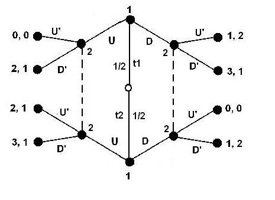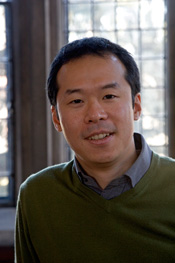In a way, economist Joon-Suk Lee is a storyteller. A suspense writer who is forever fiddling with plot and ending.
The story often starts with mistrust. Two or more parties circling each other, ready to begin a drawn-out negotiation. What can you believe? Who gives up something first? And how much does what you reveal affect the outcome?
Lee is a game theorist. Game theory originated as a branch of applied mathematics that models and predicts how choices between interacting agents will affect the outcome of the game.
Among its many applications, it has been used to calculate chess strategy, coordinate Air Force bomber formations, facilitate corporate mergers, drive auction bidding and helped determine foreign policy.
It begins, says Lee, with the premise that in human decision-making “we are selfish, predictable and driven by a fairly narrow set of criteria.” After that, however, there are innumerable ways of plotting moves, anticipated responses, and predicted outcomes.
Lee is examining aspects of game theory that involve complex negotiation strategies. His most recent research focuses on the role and mechanics of reputation in repeated negotiations—a subject with highly topical parallels in world affairs, such as negotiations over North Korea’s nuclear weapons program.

A graphic depiction of a game with complete but imperfect information represented in extensive form.
“What happens when two sides negotiate that don’t trust each other and don’t know each others’ agenda?” says Lee. “The key question is one of building trust. I have modeled a scenario where one side takes a small issue and deliberately makes a sacrifice. It signals to the other side, yeah, okay, I really didn’t get everything I could have. That might strengthen the belief of the other side that it’s worth a gamble, that they’ll trust you enough.”
In practice, these concepts read more like this: Pr(w= 1|s,m1) >Pr(w = 0|s,m1)[AN1].
“Yes, much of game theory can be rather nebulous, as it quickly devolves into straight algebra,” says Lee. “But what is interesting about its application is we can describe the particular benefits of all sorts of actions by using variables and mathematical formulas — X could represent your particular action and X plus 10 may then represent the amount of lives saved, or territories conquered.
“You can model the benefits of choices people make, how the future might or might not turn out, figure out the best benefit to my economy or country.”
Lee says students in his Game Theory class get particularly fired-up when he illustrates game theory by using it to describe the inner workings and struggles of real-world organizations: “If I can give examples — in 1984, this firm bought all these firms and this happened … it sets up and motivates all kinds of questions. That’s when students recognize names and go, ‘Oh wow! This is a newfangled tool we can use to really understand what happened.’ ”
Interestingly, although Lee uses game theory to describe likely outcomes, he also seems to relish the exception: “I think game theory takes a fairly dim view on human behavior,” he says. “To some extent you might say it strips off all the richness of humanity, and in many instances, it only gives you a first rule of thumb indication of what is going to happen.
